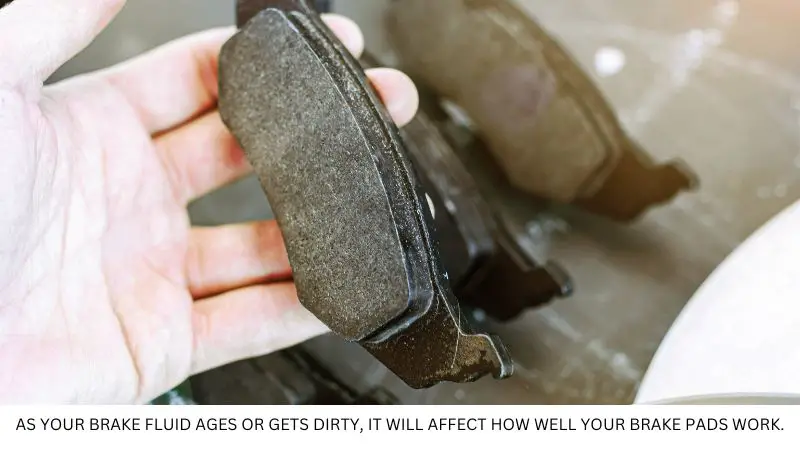
As with everything in your automobile, you must change your brake fluid periodically. If you do it, you can avoid expensive repairs and ensure your brakes apply proper pressure. You should determine how often you should change your brake fluid.
Generally, driving style should influence when to change brake fluid. Changing the liquid to a 2% water level is better if you use your vehicle for towing or high-speed driving. All cars must change the brake fluid when the water level exceeds 3%. However, before discussing when to change brake fluid, let’s discuss brake fluid changing signs.
Signs You Should Change Your Brake Fluid
A clear sign of changing your brake fluid is total brake failure. Fortunately, your car gives you many safety signs when changing brake fluid. So if you notice any signs, you should have your mechanic check your brakes. Let’s see the symptoms of changing your brake fluid:
Problems With Your Pedals
If the brake fluid is old or leaking, you can only press your pedal slowly. Usually, this is a sign that you may need more fluid in your brake lines. Yet, when your brake pedal becomes unusually soft, you must change the brake fluid. Ignoring these signs can cause brake failure or make braking exceptionally complicated.
Illuminated ABS light
Your car’s ABS light is the anti-lock braking system. It lets you know something is wrong with your braking system when it lights up. The common cause for this light is that you should change your brake fluid or turn it off.
Of course, other factors could cause your brake light to come on. Always check your brakes with a professional to ensure there aren’t more severe underlying problems.
Your Brake Pads Are Not Operating Well
As your brake fluid ages or gets dirty, it will affect how well your brake pads work. You may hear a screeching, grinding, or other strange noise from your brakes. Another telltale sign is that your brakes take a little longer to bring you to a complete stop.
A Burning Smell
Overheated brakes make a harsh chemical smell similar to burnt rubber or metal. Pull over immediately if you see any of these smells in your car. Likewise, let your brakes cool down before damaging your wheels or brakes.
Check Also: Causes & Symptoms of Low Brake Fluid In A Car

Determining How Often To Change Brake Fluid
Your hydraulic brake fluid is one of the most important aspects, but it is often overlooked. Typically, checking your brake fluid regularly is essential. But when you check, it depends on the vehicle model and how often you drive your car.
You can change your brake fluid every two years or 20,000 miles. But not all vehicle conditions will be the same. Some vehicles may need their fluid changed more or less.
When you check the fluid, it’s better to change your oil. It’s because, if you do it, you can keep track of how long you have before replacing it. Before replacing the fluid, you should check your owner’s manual for recommended intervals for your model.
Additionally, if you press down on your brake pedal and feel spongy or loose, you probably need to change your fluid. Similarly, if you notice a delay when hitting the brakes, you probably need to replace the fluid. Besides, if your brake light comes on suddenly, it’s probably time to replace the fluid. The brake’s job is to bring the car to a complete stop immediately. But when they can’t do it, you should check your fluid level directly.
How Long Does Brake Fluid Last In A Car?
As a general guideline, 50,000 miles will be best, some sources tell you. Others may indicate a number between 25,000 and 70,000 miles. And some people try their best to reach 100,000, although this is not recommended. It may be helpful to have a number to guide you. Remember that the range difference is roughly twice the circumference of the Earth.
Brake Fluid Change Vs. Flush:
However, a fluid change can’t replace all fluid in the system. Fresh fluid helps clean the system, but you must sometimes complete a fluid flush.
This is a more detailed process where the complete liquid line system is flushed. With this flushing process, everything is drained before introducing new fluid. It removes all impurities, gunk, and debris so your system lines are new.
It is recommended to flush the hydraulic brake fluid or radiator coolant occasionally thoroughly. You can replace your brake fluid when the fluid level is low. A brake flushing or fluid exchange completely removes any old fluid.
Your technician usually uses a pressure flushing machine until any old fluid is clear. This process allows you to fill your system with entirely new brake fluid. After doing this, bleeding can also happen; you ensure no air is in the braking system.
It would help to do this when you see brake fluid degradation signs. Though this procedure is usually expensive, have your service technician confirm that it is essential.
When Does Toyota Brake Fluid Change?
As a rule of thumb, Toyota recommends changing your brake fluid every two years or 20,000 miles. All are not the same; some vehicles have different brakes than others. Changing the liquid depends on your car’s age and driving condition. The climate is also responsible for this. The brake fluid absorbs more moisture in a humid environment than in hot and dry climates.
It’s best to test every time Toyota experts say your brake fluid has a good condition. Withabraje a fluid tester, the technician collects a sample and heats it to check the boiling point.
You can buy a DIY brake fluid tester to test the brake fluid, but they must be more accurate. You will use this process when you have an emergency. So it’s best to check your brake fluid with a Toyota technician.
Brake Fluid Change Cost Toyota:
For all vehicles, the average brake fluid change cost is £50, and £40 and £90 are the price range. Actual brake fluid is not expensive but will vary depending on the type of brake fluid required. In contrast, Toyota’s brake fluid change cost is about £72.
Booking a service with ClickMechanic will further reduce brake fluid change costs. The exact price depends mainly on your vehicle and the recommended type of fluid.
How Often To Change Brake Fluid Honda?
Different car manufacturers offer different schedules for changing the brake fluid. For example, you may require to change the brake fluid for Honda every 2 to 3 years and 30,000 to 40,000 miles.
You will find more details about it in your vehicle’s owner’s manual. To be safe, it’s a good rule of thumb to replace the brake fluid every two years if you’re unsure.
For this reason, it is better to change your car’s brakes more frequently than to be safe. Furthermore, if you drive more than the average person, you should change brake fluid more frequently.
But if you need to figure out how long you should wait between changes, it’s better to be safe regarding car maintenance. Changing a fluid more often is much better than waiting too long.
Honda Brake Fluid Change Cost:
A Honda Accord, Crv, or Civic brake fluid flush or replacing old fluid can cost around $90-$200. Basically, the cost depends on the brake fluid you choose and the brake service labor charges in your area. Other things that can affect the price include your car’s model, engine, and make.
What Happens If You Don’t Change Brake Fluid?
When did you change your brake fluid for the last time? If you need help remembering, you’re not alone. Brake fluid plays an essential role in your braking system. But most people neglect it. But what happens when you don’t change the brake fluid? Let’s discuss below:
Moisture Pollution
There’s a reason your mechanic told you not to open your brake fluid reservoir unless necessary. This is because the liquid is hygroscopic, readily absorbing any moisture present. This explains why your brake fluid is designed to operate in a sealed environment.
Even with a sealed system, moisture is inevitable because of fluid being absorbed as the fluid ages. Being careless about how long you take to drain your brake fluid can also expose it to excess moisture.
Debris Buildup
Over the brake fluid ages, it’s bound to become polluted with debris. Seals and hoses can shed small amounts of rubber as they age. Moisture-laden brake fluid can rust and corrode metal components. As a result, the rust particles find their way into your brake fluid.
Closing your brake fluid reservoir cap incorrectly can allow grime, dirt, and other junk to pass through the brake system.
Poor Braking Performance
If you change your brake fluid on time, your braking ability will improve. Yet, if you feel incredibly spongy, you must change your brake fluid.
Furthermore, if you don’t change your brake fluid to stop, your car may take more effort. Sometimes, you may need to pump your brakes to create enough pressure to stop safely. In particular, your brakes also will fail. Mainly, this can occur if the brake fluid reaches its boiling point under operation.
Final Word:
Regarding car maintenance, changing your car’s brake fluid may not be on your list. But neglecting your brake fluid can cause severe damage to your braking system. After that, it can increase your risk of an accident. It would help if you changed your fluid to keep your car in good condition and prevent problems.
Though changing the brake fluid is essential, everyone must know when to change it. This article helped you to know when to change and the potential warning signs of brake fluid change.
Check
Castrol SRF Vs. Motul 600: Which Is the Best Brake Fluid Brand?

